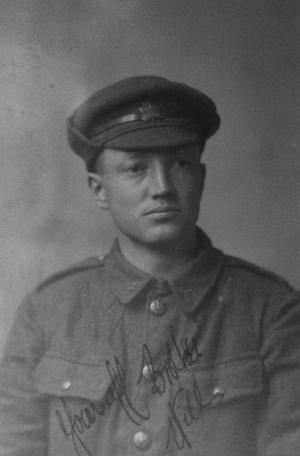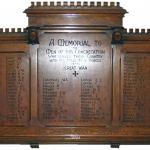Circumstances of Casualty: Killed in Action. This soldier was on duty in the front line, when an enemy shell penetrated the roof of the dugout in which he was sitting, killing him instantly.
Location of Unit at Time of Casualty: Vicinity of Ploegsteert.
BX April 13, 1916
“If I Go Under be Proud Because You Can Say I Have Done my Best” – Heroic Words Written On Eve of Death – So Wrote Sapper William Betts in a Letter to His Mother Here, This Proving the last Received Previous to the News of His Death on the Field of Honor – “A Man Shouldn’t be Afraid to Die Out Here” He wrote.
Today’s casualty list announces the death of Sapper William Hayes Betts, 41 Ontario Street. Sapper Betts was slightly wounded last fall, but was again in action till March 25, when he was killed. He left Brantford with Col. Colquhoun and was only recently transferred to the engineers. He is unmarried and before enlistment worked at Goold, Shapley & Muir’s as a core maker. One brother, Frank, is now at the front, while his parents, four other brothers, Kenneth, Clare, Vernon, Harry and Roy, the last named of Winnipeg, and three sisters, Florence, Margaret and Eva, survive. Mrs. Margaret F. Betts, his mother, received the official news yesterday.
That Sapper William Betts had a premonition of his death seems to be the case. The last letter received from him, previous to the receipt of the news of his death, contained the following:
I hope this war is soon over, but it won’t do any good to say that, as the Huns are a long way from being beaten yet. I will be able to tell some stories if ever I get back, but that is a small possibility.
But a man shouldn't be afraid to die out here. That is the way I look at it, as a person sees fine fellows going under every day – fine, brave men. So I am always going to try to do my share. If I go under don’t feel bad about it, but be proud, because you can say I have done my best.
This causes the first break in the family circle of ten children.
BX April 17, 1916
Memorial Service for Sapper Betts
A large congregation assembled in Wesley Church last night to participate in the memorial service held in memory of the late Sapper William Hayes Betts, whose mother and sisters are valued members of the church.
The text chosen by the pastor, Rev. D.E. Martin, was to be found in John’s gospel XIX; 30: “It is finished.” “These three words constitute the greatest sentence ever uttered, and refer to something world-wide and something specific,” said the pastor.
In answer to the question “what was finished,” the following propositions were discussed:
The earthly life of Christ was finished. The text was the worker’s cry of achievement and the sufferer’s cry of relief. The intent of the Old Testament scriptures was finished. What the law required, what the prophet’s foretold, and what the Old Testament types foreshadowed, were accomplished in Jesus Christ.
The revelation of God and the revelation of man were finished. In the murders of Christ we saw how low down the human can go, and in the triumph of Christ over pain we saw how high humanity can go. The clearest view the world has had of Jesus, was in the outpoured love of the Son of God on the cross.
A redemption covering man’s past, present and future was finished. It provided for the guilt, the defilement and the power of sin. It provided also for the gift of the Holy Ghost and the desire for immortality. The speaker referred to the late Sapper Betts as a first class mechanic, as a young man of intelligence and comparatively wide reading, and as a companionable man among his shop-mates. Letters recently received from the front disclosed the spirit of a true British soldier. He expressed himself as desiring “to do his best,” which, no doubt he was doing when the call came. There was also an evidence of growing seriousness born of the tragic environment of war.
The sympathy of Wesley Church was extended to the bereaved family. This is the first casualty in the long list of those who have gone from the families of the congregation and it brought the realities of the war closer to many homes and many hearts.
The church was appropriately draped and decorated, and the choir furnished special music fitting to the impressive occasion.


